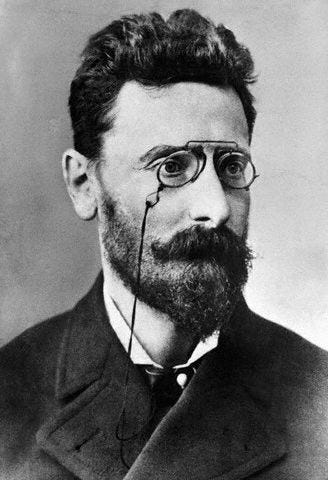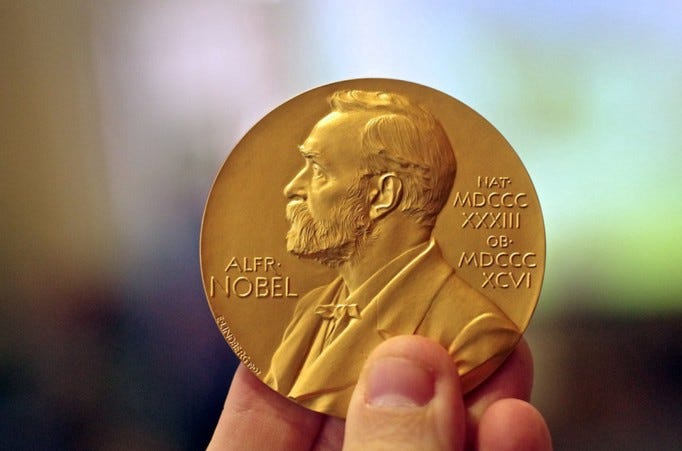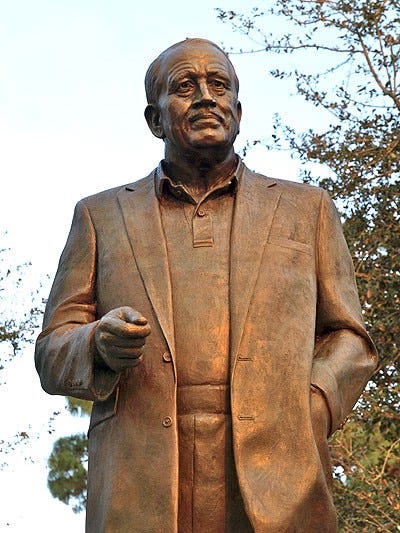3 Famous Awards With Incredibly Dark Origin Stories
#1. The Pulitzer Prize and a presidential assassination
"All is vanity, nothing is fair."—William Makepeace Thackeray
Who doesn’t dream of climbing to the peak of their profession? Almost every industry under the sun has one award or another to recognize doing just that.
Actors secretly covet holding the definitely-not-phallic golden statue of a naked male knight presumably named Oscar holding a “sword.”
Singers strive to be recognized with a statue of a gramophone — which as a millennial — I assume is ostensibly an early prototype of the iPod.
Artists work their whole lives to have a random cartoon become extremely popular only to see it co-opted by political extremists with an uncanny lack of humor and/or intelligence.

We all want to be recognized for our work, especially if we have specialized and perfected our craft over decades. But not all awards were created equally. Many of them exist to reshape the public image of not-so-benevolent titans of industry.
Here are three awards with a dark history under shadowing their benevolent purposes.
If you enjoy this type of work, please consider subscribing for free to A Pryor Thought. Thanks!
The Pulitzer Prize and an Assassination
“Put it before them briefly so they will read it, clearly so they will appreciate it, picturesquely so they will remember it and, above all, accurately so they will be guided by its light.” — Joseph Pulitzer

I’m sure a few of these questions have crossed your mind in recent years:
Who can we trust?
What information should we believe?
Who’s actually behind the news we read?
These problems won’t go away anytime soon.
One of the easier solutions is to look for trusted sources. And what could be more trustworthy than a journalist with “Pulitzer Prize Winner” on their resume?
If anything, it affords the journalist an air of uniqueness, integrity, and grit. For both the reader and the writer, it’s a win-win.
But the Pulitzer Prize was created to mask over — among other things — how the Pulitzer name used to be associated with the assassination of a sitting U.S. President.
Over a century ago, the term “yellow journalism” referred to news articles that were published solely to make money or influence rather than to inform people.
Headlines used extreme exaggeration, scandal creation, and sensationalism to catch readers’ attention. This era of fake news even strongly spurred sentiment to go to war with Spain, and it certainly contributed to the kick-off of the Spanish-American War.
William Randolph Hearst, one of the largest media barons at the time, was famously quoted as saying:
“You furnish the pictures, I’ll provide the war!”
But even that quote about creating fake news is apparently fake, too.
The news environment during this period of the 1880s to 1900s was dominated by competition between William Randolph Hearst and Joseph Pulitzer.
It was their ongoing bitter rivalry that led to more and more battling over eyeballs — often to the detriment of truth and society.
It came to a head in 1901 after two columnists, Ambrose Bierce (a famous satirist) and Arthur Brisbane (an editor), separately published pieces interpreted as calling for the assassination of President William McKinley.
Fast forward to September of that year — McKinley was shot twice in the stomach and later died from his wounds. He was the 3rd president of the United States to be assassinated.
Hearst and Pulitzer were attacked left and right. Their battle for domination of the news was blamed for fanning the flames of this foul deed.
And it shook Joseph Pulitzer to the core.
Snapped back into reality, he ordered his major newspaper, New York World, back to its roots of quality reporting and ceased the sensationalist battle. In 1904, Joseph wrote his will to include $2 million for an annual journalism award to be managed by Columbia University.
Joseph Pulitzer passed away in 1911. His will funded the new Columbia School of Journalism and opened in 1912. The first Pulitzer Prize was awarded a few years later in 1917.
The Nobel Prize and the Merchant of Death
“It is not sufficient to be worthy of respect in order to be respected.” — Alfred Nobel

Alfred Nobel was born in Stockholm, Sweden in the black and white years of 1833 to an intelligent but relatively poor family. His list of accomplishments was substantial.
He was:
An engineer, chemist, businessman, inventor, and philanthropist
Fluent in Swedish, Russian, French, German, Italian, and English
A patent holder at the age of only 24, attaining 355 patents over his lifetime
A prolific businessman owning over 90 factories by the time of his death
What were those factories producing?
This fact might blow you away — it was dynamite. Alfred’s invention. He created this world-impacting technology as a response to the death of his brother in a family-owned nitroglycerine factory explosion a few years before.
He set about getting vengeance on karma by wanting to prevent other people from dying from explosives in the future — by making better explosives.
Every general, pioneer, miner, and construction firm in the world wanted mountains of the sticks as soon as they could get them. It led Alfred to a life of worldliness and opulent wealth.
Fast forward to 1888. Misfortune struck another brother.
Ludvig Nobel, amazingly also one of the richest people in the world at the time, died from a heart attack at the youngish age of 56. Alfred was of course, distraught by the passing.
Nothing reminds us more of our own mortality than when a close friend or relative dies. Alfred had a bit more reason to worry though. The newspapers reported it was, in fact, he, who had died.
A prominent French paper showcased the title:
“Le marchand de la mort est mort.”
For non-French speakers, that probably means nothing. For French speakers, it means “The merchant of death is dead.”
The true opinion of the public came out, now that he had “died.” He was a warmonger. The complete opposite of his self-image as a pacifist.
So, what’s one of the richest war profiteers in the world to do?
Why, rewrite history, of course!
Alfred turned on his tabletop gaslight to the max and put his powerful mind to creating a plan for saving his legacy. He wanted to be remembered not as a war profiteer, but as a man who helped the best of humanity.
The Nobel Foundation was set up with close to 94% of his vast $200 million US fortune (in today’s equivalent). He wanted to reward the best of the best in several important fields of science— and put his big shiny name on it.
A few years later on the 10th of December, 1896, Alfred passed away from a stroke, and his will establishing the foundation was disseminated.
The first Nobel Prize was awarded on the fifth anniversary of Alfred Nobel’s death in 1901, awarding up to $1.4 million USD annually to “those who, during the preceding year, have conferred the greatest benefit to Mankind.”
The Genius Grant and Insurance Fraud
“I figured out how to make the money. You fellows will have to figure out how to spend it.”—John D. MacArthur

John D. MacArthur was born in 1897 in relative poverty. He later went on to pursue education to the highest aspirational levels of the modern-day MAGA party.
He dropped out in the eighth grade.
John’s father was a Baptist preacher. His brother won an Academy Award as a screenwriter. His sister-in-law was the famous actress Helen Hayes. Another brother owned a small insurance company.
John went into sales.
He got a taste of insurance early on working with his brother. People got a taste of John’s ethics later on when he left his first wife and two children to marry his hot secretary.
Now with a bit of cash — her family was somewhat wealthy — they went and bought a struggling small life insurance company called Banker’s Life and Casualty, running the company alongside his new investor-with-benefits.
The next few decades resulted in John climbing the ranks to become one of only two billionaires in all of the U.S. at the time of his death.
As you might imagine, his rise to the top was full of admirable acts, such as:
Creating the country’s cheapest (by far) insurance plans, only costing $1
Being one of the first adopters of a nouveau marketing technique, sending out flyers to millions of homes
One of the only large employers in the country in the 1940s to employ hundreds of older and handicapped workers
But of course, there were a few tangles on the way:
His company seemingly had a policy of never paying out insurance claims unless repeatedly pestered by bewildered customers
Another hidden policy ascribed the incorrect mailing address to most payout checks, never to be paid
“(The) basement ceilings were unusually low. … Bankers was still able to make this usable space, however, by hiring dwarfs as custodians.”
Oh, and his second wife almost divorced him after finding out:
They were never legally married 20 years earlier
She wasn’t legally entitled to any part of this new massive life insurance fortune.
He had attempted to secretly seize ownership of her stock
He frequently enjoyed groping unwilling female employees
Fortune-ately, she eventually came to her senses and reunited with him. They worked out their differences and put her legally on the books for everything.
Years later when it came time to retire, John had another problem. He was one of only two billionaires in all of the US!
Wait, that was society’s problem, not his. Phew, I’m sure glad we solved that one and don’t have 724 of them now.
His real problem?
He didn’t want his left-leaning kids wasting his hard-won fortune. And since he didn’t want to leave his wealth to them, that meant the government would get its dirty dirty paws on his life-denying money and business.
What do you do if you’re one of the richest people in the world and don’t want to pay taxes?
Start a charity! A strong tradition that continues to this day. He set up the MacArthur Foundation with the mission to avoid taxes, ensuring his fortune would keep on benefitting absolutely no one.
He filled it with a bevy of conservatives; radio commentator Paul Harvey, two Banker’s Life executives, and former Nixon administration Treasury Secretary William Simon.
He also plopped his son on the board, J. Roderick MacArthur, having reconciled their relationship in his older years.
His staunchly liberal son.
The new foundation promptly started distributing money to all of their favorite heavily conservative causes of the time. Presumably anything related to prolonging the suffering of 90% of Americans.
And guns for babies.
But no matter the conservative efforts, they couldn’t get rid of that pesky liberal son of his. Roderick spent his last remaining years overhauling the foundation and slowly replacing the morally-obscure board with people who actually wanted to help humanity.
And he succeeded, albeit dying before seeing most of the changes come to fruition.
The new board implemented many of his plans in the years after his death. General observers now feel the “genius grant” is mostly rationed out to left-leaning causes like climate change solutions, justice reform, disease research, and nonprofit journalism.
If John D. MacArthur saw what his willed $7.5 billion private foundation has become today, he’d probably need a few extra life insurance policies just to deal with the resulting heart attacks.
This message brought to you by J.J. Pryor
👇Click the heart thingy? The algorithm loves it. I love it more.👇
Additional References:
https://www.nobelprize.org/uploads/2018/08/prize-amounts-2021.pdf
https://www.britannica.com/biography/Bertha-Freifrau-von-Suttner
https://www.britannica.com/biography/William-Randolph-Hearst
https://www.nytimes.com/1991/08/01/opinion/l-hearst-didn-t-send-cable-to-remington-511891.html
Photo credit: Photo by Aleksandar Pasaric from Pexels
Article originally posted on Medium.com.






You may consider me as "hit in the face."
I just had the time, in between PB&T sandwiches and bourbon chasers to re-read this article. Through my bloodshot eyes, I saw the name, Ambrose Bierce. After a little research, I have decided to read some of his musings - especially the Devil's Dictionary. His view of the world, around 100 years ago, is even more accurate today - at least in my opinion. I always learn something from your writings - which only shows how little I knew before making your writing acquaintance.